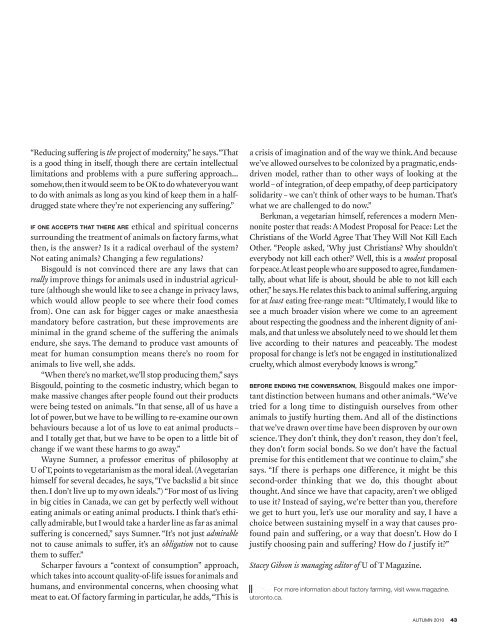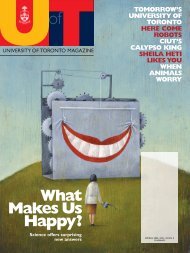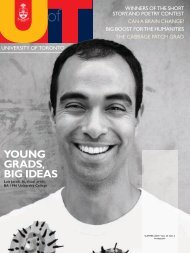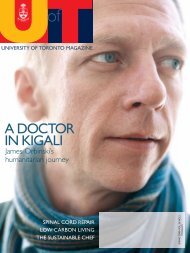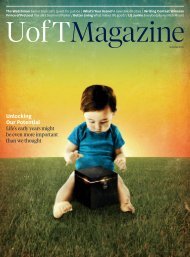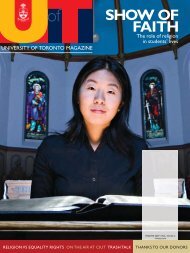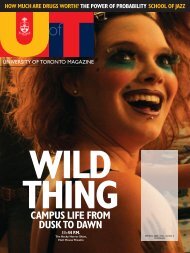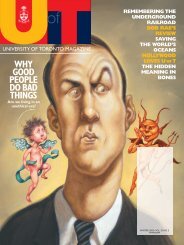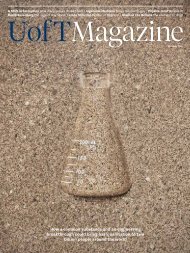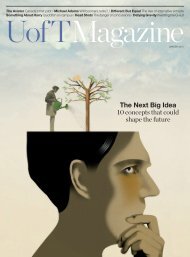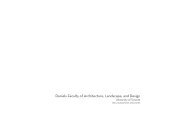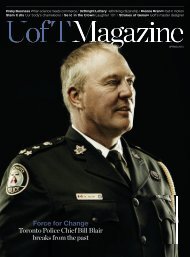pr<strong>of</strong>oundly at odds with their nature to be constantly pennedor separated. The opposite extreme, <strong>of</strong> overcrowded living conditions,prevents animals from establishing a social hierarchy– which leads to aggression. “It’s like people trapped in acrowded elevator,” says Stephanie Brown. “Eventually, they aregoing to start to fight.”Although we are now more scientifically fluent about the innerlives <strong>of</strong> animals, we are more likely to treat them like, well,Descartes’ furry machines. Legally, all animals are property(and always have been), meaning we own them and can usethem for our own purposes, says Lesli Bisgould, who is currentlywriting a book on animals and the law. Whether onelooks at the Criminal Code’s general anti-cruelty laws or atlegislation that applies to agricultural animals, one findsthe same qualifiers – prohibiting “unnecessary” or “undue” or“prolonged” pain and suffering, she says. “That means we havepermitted ourselves to cause necessary pain and suffering. Andwhat does that mean? When is it necessary?” asks Bisgould.“You’d never use the word ‘necessary’ in that context withanother human being.”While in the eyes <strong>of</strong> the law, an animal is property, a corporationcan be granted rights <strong>of</strong> personhood – making, legally, ananimal an “it” and a corporation a “he” or “she.” (Corporations,<strong>of</strong> course, also have privacy rights – their facilities are privateproperty, making it next to impossible to see how any animalsthey own are treated.) Animals – displaced from their naturalenvironments and deprived <strong>of</strong> acting out many <strong>of</strong> their instincts– are essentially rendered into units <strong>of</strong> production. “Corporations,by law, are required to maximize pr<strong>of</strong>its. That’s theirobligation to their shareholders,” says Bisgould. “Every pennyspent on animal welfare is a penny that doesn’t go into pr<strong>of</strong>its.”When it comes to legal rights for animals, Bisgould advocatesfor a large-scale shift in thinking: if corporations can havelegal personhood, why would we not extend the same rights toliving entities other than humans? She adds, “It’s a bit <strong>of</strong> a circularproblem, because if animals were legal persons – meaningnot that they have human rights, all the same rights we have,but the basic rights to their lives and to have their interestsconsidered before we do things that are going to hurt them – ifit ever got to that point, it’s unlikely we’d be eating them. Becausetheir interests in their lives would conflict with our relativelytrivial interest in eating them.”“What does it do to your psyche and to your spiritual well-beingif you are part <strong>of</strong> this system <strong>of</strong> violence?” asks StephenScharper, a pr<strong>of</strong>essor <strong>of</strong> anthropology at U <strong>of</strong> T Mississaugaand U <strong>of</strong> T’s Centre for Environment, who focuses on issues<strong>of</strong> religion, ethics and the environment. Scharper views factoryfarming as a “seamless garment <strong>of</strong> violence”– one thatviolates the dignity <strong>of</strong> animals, contributes to environmentaldestruction, and <strong>of</strong>ten employs non-unionized workers andpays them minimum wage for work that can be both emotionallytroubling and physically dangerous.Scharper points to several religious traditions concernedwith the peaceful, respectful treatment <strong>of</strong> animals. Followers<strong>of</strong> the Jain and Hindu religions abstain from meat entirely,believing that the cycle <strong>of</strong> violence brings with it bad karma– which would affect their salvation. He also cites Judaism’skosher dietary laws and the Islamic tradition <strong>of</strong> halal, both<strong>of</strong> which have strictures on how animals are to be treatedduring their lives and slaughter. Scharper, a Christian himself,is the co-editor <strong>of</strong> The Green Bible, which interpretsChristian scriptures through an environmental lens. Henotes that one <strong>of</strong> the first injunctions in Genesis – to takecare <strong>of</strong> the garden – can pertain to both the environmentalcrisis and animal welfare. “If we are defacing God’s creaturesand God’s creation, we are rupturing our friendship withGod, living a life <strong>of</strong> sin and therefore affecting our futuresalvation,” he says.Pr<strong>of</strong>essor John Berkman <strong>of</strong> Regis College ties the notions<strong>of</strong> non-violence and respect for other beings into an evenbroader theological framework. He notes that every animal(human or non-human) deserves the opportunity to live welland to flourish according to his or her own abilities, withinhis or her own community – whether the animal is a dolphinin a school <strong>of</strong> dolphins or a cow grazing in a pasture with aherd. And respecting the natures <strong>of</strong> others, and recognizingour place within the larger picture, shows up in many religions.“This gets to a theological vision that ultimately theworld is not to be disposed <strong>of</strong> however humans deem, buteach creation has its own end, its own telos, its own purposes,and part <strong>of</strong> human life is to understand and respect thosevarious purposes – not only those <strong>of</strong> human beings,” he says.Because Berkman believes respecting the natures <strong>of</strong> otheranimals and giving them the opportunity to flourish is soimportant, a pure reduction-<strong>of</strong>-pain model concerns him.42 WWW.MAGAZINE.UTORONTO.CA
“Reducing suffering is the project <strong>of</strong> modernity,” he says. “Thatis a good thing in itself, though there are certain intellectuallimitations and problems with a pure suffering approach…somehow, then it would seem to be OK to do whatever you wantto do with animals as long as you kind <strong>of</strong> keep them in a halfdruggedstate where they’re not experiencing any suffering.”if one accepts that there are ethical and spiritual concernssurrounding the treatment <strong>of</strong> animals on factory farms, whatthen, is the answer? Is it a radical overhaul <strong>of</strong> the system?Not eating animals? Changing a few regulations?Bisgould is not convinced there are any laws that canreally improve things for animals used in industrial agriculture(although she would like to see a change in privacy laws,which would allow people to see where their food comesfrom). One can ask for bigger cages or make anaesthesiamandatory before castration, but these improvements areminimal in the grand scheme <strong>of</strong> the suffering the animalsendure, she says. The demand to produce vast amounts <strong>of</strong>meat for human consumption means there’s no room foranimals to live well, she adds.“When there’s no market, we’ll stop producing them,” saysBisgould, pointing to the cosmetic industry, which began tomake massive changes after people found out their productswere being tested on animals. “In that sense, all <strong>of</strong> us have alot <strong>of</strong> power, but we have to be willing to re-examine our ownbehaviours because a lot <strong>of</strong> us love to eat animal products –and I totally get that, but we have to be open to a little bit <strong>of</strong>change if we want these harms to go away.”Wayne Sumner, a pr<strong>of</strong>essor emeritus <strong>of</strong> philosophy atU <strong>of</strong> T, points to vegetarianism as the moral ideal. (A vegetarianhimself for several decades, he says, “I’ve backslid a bit sincethen. I don’t live up to my own ideals.”) “For most <strong>of</strong> us livingin big cities in Canada, we can get by perfectly well withouteating animals or eating animal products. I think that’s ethicallyadmirable, but I would take a harder line as far as animalsuffering is concerned,” says Sumner. “It’s not just admirablenot to cause animals to suffer, it’s an obligation not to causethem to suffer.”Scharper favours a “context <strong>of</strong> consumption” approach,which takes into account quality-<strong>of</strong>-life issues for animals andhumans, and environmental concerns, when choosing whatmeat to eat. Of factory farming in particular, he adds, “This isa crisis <strong>of</strong> imagination and <strong>of</strong> the way we think. And becausewe’ve allowed ourselves to be colonized by a pragmatic, endsdrivenmodel, rather than to other ways <strong>of</strong> looking at theworld – <strong>of</strong> integration, <strong>of</strong> deep empathy, <strong>of</strong> deep participatorysolidarity – we can’t think <strong>of</strong> other ways to be human. That’swhat we are challenged to do now.”Berkman, a vegetarian himself, references a modern Mennoniteposter that reads: A Modest Proposal for Peace: Let theChristians <strong>of</strong> the World Agree That They Will Not Kill EachOther. “People asked, ‘Why just Christians? Why shouldn’teverybody not kill each other?’ Well, this is a modest proposalfor peace. At least people who are supposed to agree, fundamentally,about what life is about, should be able to not kill eachother,” he says. He relates this back to animal suffering, arguingfor at least eating free-range meat: “Ultimately, I would like tosee a much broader vision where we come to an agreementabout respecting the goodness and the inherent dignity <strong>of</strong> animals,and that unless we absolutely need to we should let themlive according to their natures and peaceably. The modestproposal for change is let’s not be engaged in institutionalizedcruelty, which almost everybody knows is wrong.”Before ending the conversation, Bisgould makes one importantdistinction between humans and other animals. “We’vetried for a long time to distinguish ourselves from otheranimals to justify hurting them. And all <strong>of</strong> the distinctionsthat we’ve drawn over time have been disproven by our ownscience. They don’t think, they don’t reason, they don’t feel,they don’t form social bonds. So we don’t have the factualpremise for this entitlement that we continue to claim,” shesays. “If there is perhaps one difference, it might be thissecond-order thinking that we do, this thought aboutthought. And since we have that capacity, aren’t we obligedto use it? Instead <strong>of</strong> saying, we’re better than you, thereforewe get to hurt you, let’s use our morality and say, I have achoice between sustaining myself in a way that causes pr<strong>of</strong>oundpain and suffering, or a way that doesn’t. How do Ijustify choosing pain and suffering? How do I justify it?”Stacey Gibson is managing editor <strong>of</strong> U <strong>of</strong> T <strong>Magazine</strong>.For more information about factory farming, visit www.magazine.utoronto.ca.Autumn 2010 43


